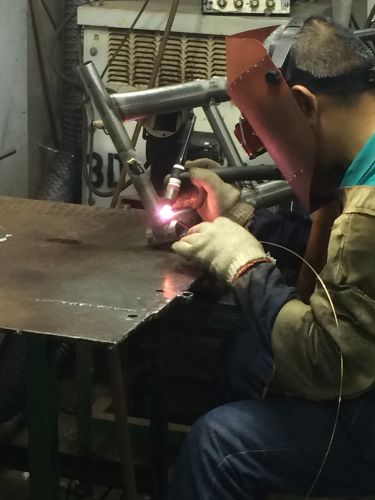I own the road: I pay road tax.
I've heard some version of this argument over the years. What drivers often forget is that those of us who don't drive are paying all of the same taxes as those who use their cars to get to the corner store. As I pointed out to someone who accused me of taking "his" parking space, the only tax I don't pay that a driver pays is the one levied on gasoline. But, in a sense, I pay for it, as other taxes, at least to some degree, subsidize the relatively low cost of petrol here in the US, just as the deductions from my paychecks help to pay for road building and maintenance.
The "I pay, I own" argument is even more emphatic, or vehement, in those places where a newly-emergent middle class is forsaking two wheels and pedals in favor of four wheels and gas pedals. That, of course, was the story of Chinese cities early in this century. Now it seems to be the narrative in Gaborone, the capital of Botswana.
Whereas most people rode bikes to school or work just a few years ago, now the bicycle has a double stigma: It is seen as archaic and something that you use only if you're poor.
I've never been to Gaborone, but according to BBC correspondent Sharon Tshipa, it's "the worst place in the world to ride a bike." Not only are the drivers as reckless as the worst kinds of teenagers, they are quite open in expressing their hostility toward cyclists. Some even threaten or promise to mow down riders.
These dangers to bicycle riders’ physical safety and mental well-being are compounded by hazards to their internal medical condition. Gaborone has some of the world’s worst air quality. The sheer volume of vehicular traffic would, by itself, be enough to degrade the city’s environment. But a particular quality of the city’s fleet makes things worse. While some new cars are imported from neighboring South Africa, many more used vehicles come from other countries, where they failed to meet emission standards.
Whether or not Gaborone is the worst place to cycle, it’s sad to see people forsake their bikes, and disturbing that such hostility has developed against remaining cyclists. From what I understand, some Chinese cities are re-discovering the bicycle. Perhaps Gaborone will do likewise one day.
I've heard some version of this argument over the years. What drivers often forget is that those of us who don't drive are paying all of the same taxes as those who use their cars to get to the corner store. As I pointed out to someone who accused me of taking "his" parking space, the only tax I don't pay that a driver pays is the one levied on gasoline. But, in a sense, I pay for it, as other taxes, at least to some degree, subsidize the relatively low cost of petrol here in the US, just as the deductions from my paychecks help to pay for road building and maintenance.
The "I pay, I own" argument is even more emphatic, or vehement, in those places where a newly-emergent middle class is forsaking two wheels and pedals in favor of four wheels and gas pedals. That, of course, was the story of Chinese cities early in this century. Now it seems to be the narrative in Gaborone, the capital of Botswana.
Whereas most people rode bikes to school or work just a few years ago, now the bicycle has a double stigma: It is seen as archaic and something that you use only if you're poor.
I've never been to Gaborone, but according to BBC correspondent Sharon Tshipa, it's "the worst place in the world to ride a bike." Not only are the drivers as reckless as the worst kinds of teenagers, they are quite open in expressing their hostility toward cyclists. Some even threaten or promise to mow down riders.
These dangers to bicycle riders’ physical safety and mental well-being are compounded by hazards to their internal medical condition. Gaborone has some of the world’s worst air quality. The sheer volume of vehicular traffic would, by itself, be enough to degrade the city’s environment. But a particular quality of the city’s fleet makes things worse. While some new cars are imported from neighboring South Africa, many more used vehicles come from other countries, where they failed to meet emission standards.
Whether or not Gaborone is the worst place to cycle, it’s sad to see people forsake their bikes, and disturbing that such hostility has developed against remaining cyclists. From what I understand, some Chinese cities are re-discovering the bicycle. Perhaps Gaborone will do likewise one day.



